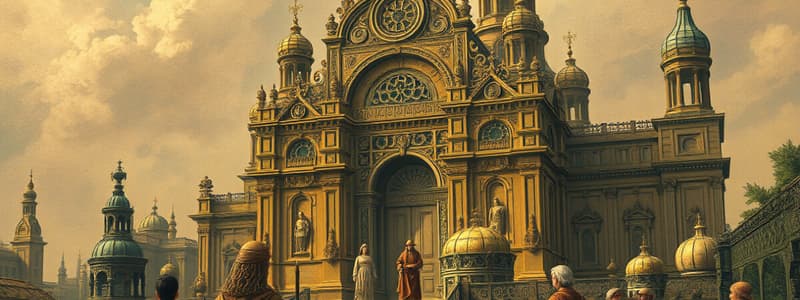Podcast
Questions and Answers
What is the theme that emphasizes man's need for civilization?
What is the theme that emphasizes man's need for civilization?
- The need for civilization (correct)
- Indifference of nature
- The loss of identity
- Fear of the unknown
What does the loss of innocence imply in the context of civilization?
What does the loss of innocence imply in the context of civilization?
It signifies a person's understanding of human nature and reality.
Civilization separates man from animals by teaching him to think and make ______.
Civilization separates man from animals by teaching him to think and make ______.
choices
Which type of power is characterized by one person threatening others?
Which type of power is characterized by one person threatening others?
Fear of the unknown is completely eliminated in the boys on the island.
Fear of the unknown is completely eliminated in the boys on the island.
How is nature portrayed in 'Lord of the Flies'?
How is nature portrayed in 'Lord of the Flies'?
Being blind and having special ______ are interwoven themes.
Being blind and having special ______ are interwoven themes.
What is a consequence of the boys using masks on the island?
What is a consequence of the boys using masks on the island?
Flashcards are hidden until you start studying
Study Notes
The Need for Civilization
- Civilization plays a crucial role in controlling humanity's darker instincts.
- Laws, rules, and authority figures are necessary to prevent a regression to primitive behavior.
- Ignoring these societal constructs can result in chaos and the emergence of primal instincts.
The Loss of Innocence
- Civilization protects individuals from acknowledging their inherent nature.
- Maturity requires an understanding of one’s instincts and reality, which transcends age.
- Acceptance of painful truths is essential for survival and personal growth.
The Loss of Identity
- Civilization distinguishes humans from animals through reasoning and decision-making.
- As societal structures falter, individuals may lose their sense of self.
- Masks symbolize the abandonment of personal identity, enabling immoral actions, including murder.
Power
- The narrative explores various forms of power and their implications.
- Democratic power involves shared decision-making among individuals.
- Authoritarian power is exercised through fear and domination.
- Spiritual power seeks to harmonize personal and universal truths.
- Brute force represents the most basic and violent form of power.
Fear of the Unknown
- The boys' fear of a beast symbolizes the terror of the unfamiliar.
- This fear grows as they obsess over the concept of the beast, fostering hysteria.
- The realization that there is no actual beast reflects a deeper understanding of their fears and psyche.
Indifference of Nature
- Nature is depicted as indifferent to human existence, contrasting traditional views of it as a nurturing force.
- Natural events can either assist or impede humanity without any conscious intent.
- This highlights the arbitrary relationship between mankind and the natural world.
Blindness and Sight
- Themes of blindness and insight are intertwined, suggesting different forms of perception.
- Those oblivious to their surroundings may possess deeper insights, yet remain unrecognized.
- Individuals with unique perspectives are often misunderstood and ridiculed by the majority.
Studying That Suits You
Use AI to generate personalized quizzes and flashcards to suit your learning preferences.




